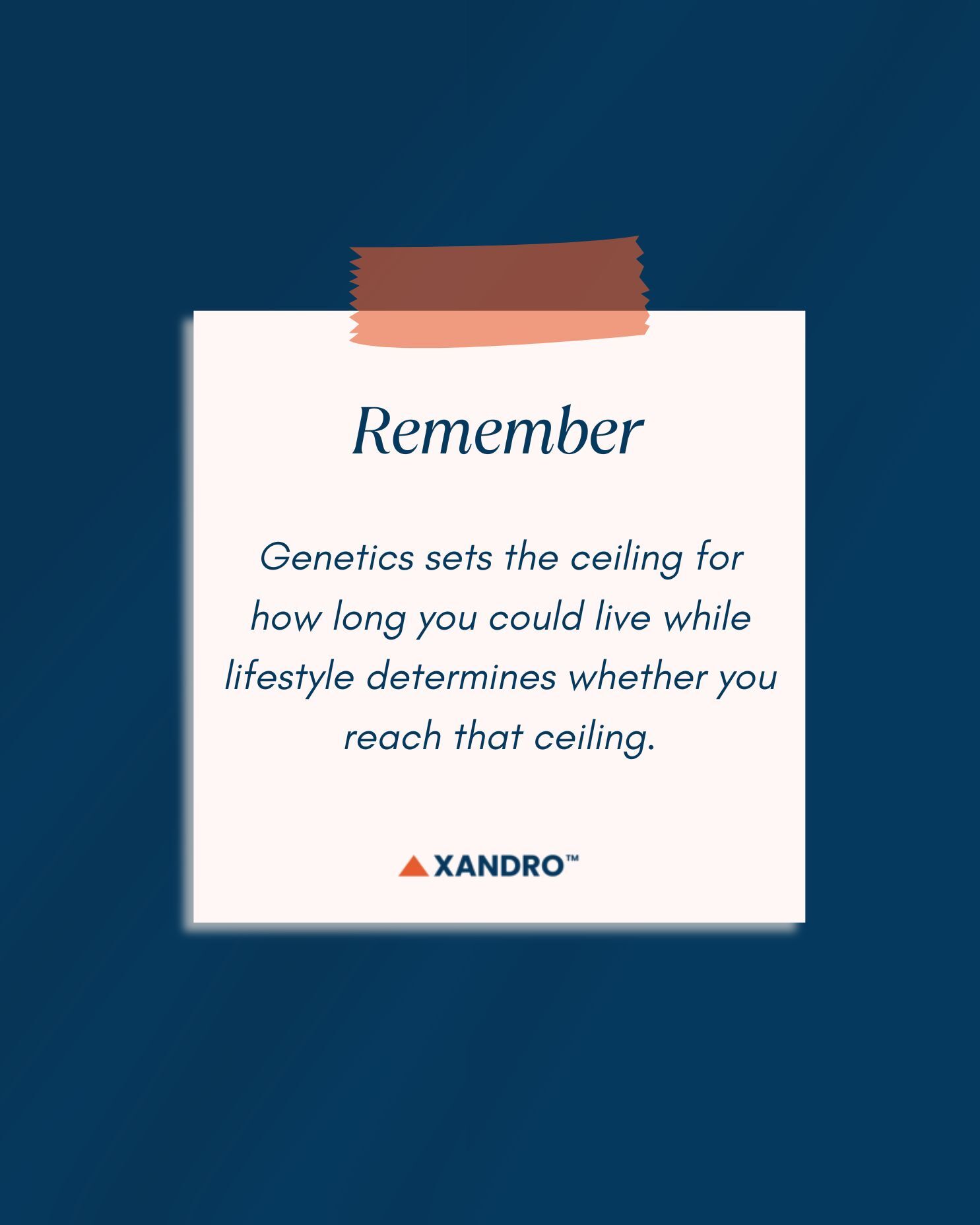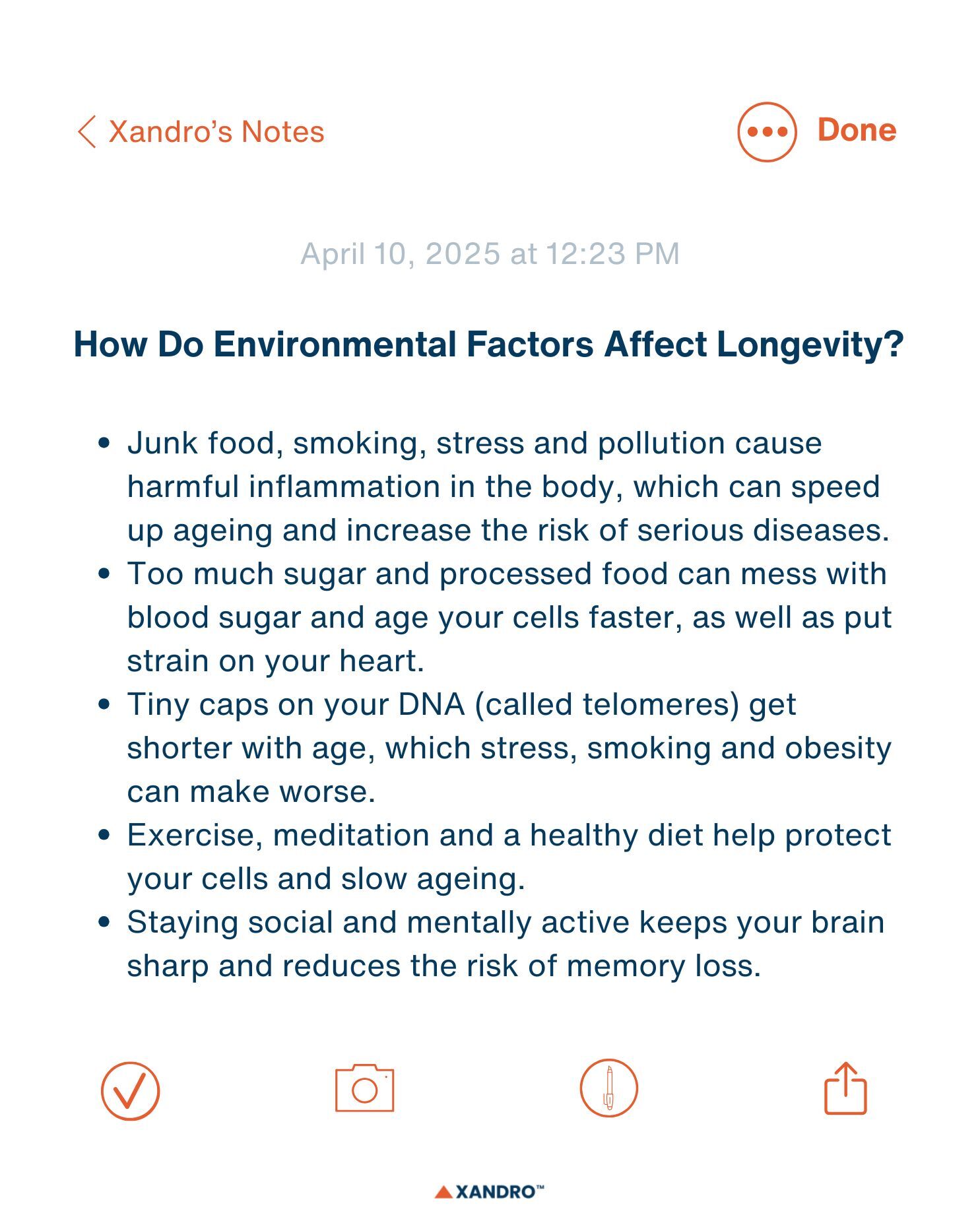Environment vs Genetics: What Really Determines Longevity?
21st Apr 2025
Environment vs Genetics: The Surprising Truth About What Extends Your Lifespan
When it comes to living a long and healthy life, is longevity genetic or lifestyle-based? While genes play a role, research overwhelmingly shows that environmental factors have a far greater impact on lifespan than genetics alone.
A study of nearly 500,000 people found that environmental and lifestyle factors (the exposome) explained around 19 per cent of lifespan differences, while genetics accounted for only 2–3 per cent. This means that daily habits — like diet, exercise, sleep and stress management (the four factors we regularly discuss to help improve your lifespan — have a much stronger influence on how long you live than your DNA.
So, why is environment more important than genetics when it comes to longevity? Let’s break it down.
Jump there now:
- How Do Environmental Factors Affect Longevity?
- What Impact Does Genetics Have on Longevity?
- 5 Factors That Influence Longevity (More Than Genetics)
- What Is the Biggest Factor in Determining Longevity?
- Ageing: Genetics vs Lifestyle – Who Wins?
How Do Environmental Factors Affect Longevity?
Environmental influences shape our health through multiple biological pathways. Some of these include:
Chronic Inflammation & Oxidative Stress
- Poor diet, smoking, pollution and stress increase inflammation.
- Chronic inflammation speeds up ageing and leads to diseases like heart disease, diabetes and Alzheimer’s.
- Antioxidant-rich foods (berries, leafy greens, nuts) help reduce oxidative damage.
Metabolic Health (Blood Sugar, Cholesterol, Blood Pressure)
- Insulin resistance (from high sugar/processed foods) ages cells faster.
- High LDL cholesterol clogs arteries, increasing heart disease risk.
- Hypertension strains the heart and kidneys, shortening lifespan.
Cellular Ageing (Telomeres & DNA Repair)
- Telomeres (protective caps on chromosomes) shorten with age.
- Smoking, obesity and chronic stress speed up telomere shortening.
- Exercise, meditation and a Mediterranean diet help preserve telomeres.
Brain Health & Cognitive Decline
- Social isolation increases dementia risk by 50 per cent.
- Lifelong learning (reading, puzzles, new skills) keeps the brain sharp.
- Omega-3s (fatty fish, walnuts) and flavonoids (dark chocolate, berries) protect neurons.
Key Lifestyle Factors That Extend Lifespan
- Physical Activity: Regular exercise improves heart health, metabolism and mental well-being.
- Avoiding Smoking: Smoking speeds up ageing and increases disease risk.
- Quality Sleep: Poor sleep is linked to higher inflammation and faster biological ageing.
- Socioeconomic Status: Higher income and education lead to better healthcare and nutrition.
- Stress Management: Chronic stress damages cells and shortens telomeres.
Further Reading: Grip Strength and why It Matters for Longevity
Biological Impact of Lifestyle Choices
|
Healthy Habits |
Negative Habits |
|
Lower inflammation |
Higher inflammation |
|
Better cholesterol levels |
Poor lipid profiles |
|
Stable blood sugar |
Insulin resistance |
|
Longer telomeres |
Shorter telomeres |
|
Stronger immune function |
Weakened immunity |
What Impact Does Genetics Have on Longevity?
While genes set the upper limit of lifespan, most people never reach their full genetic potential due to poor lifestyle choices.
- For the general population, the study showed that genetics explains only 2 to 3 per cent of lifespan differences.
- For exceptional longevity (living past 100), genetics plays a bigger role (around 25 to 30 per cent), but you still need good habits.
- Certain genes (APOE, FOXO3, CETP, SIRT6) are linked to slower ageing, but they are rare, so most people don’t have them.
Key Longevity Genes (And How They Work)
|
Gene |
Function |
Effect on Lifespan |
|
APOE |
Regulates cholesterol |
APOE2 variant → longer life; APOE4 → higher Alzheimer’s risk |
|
FOXO3 |
Controls cell repair & stress resistance |
Linked to 100+ lifespan in Okinawans |
|
CETP |
Affects cholesterol metabolism |
Slows heart disease in centenarians |
|
SIRT6 |
DNA repair & metabolism |
Extends lifespan in animal studies |
Genes vs. Lifestyle in Disease Risk
|
Disease |
More Influenced by Environment |
More Influenced by Genetics |
|
Lung cancer |
✅ (Smoking, pollution) |
❌ |
|
Heart disease |
✅ (Diet, exercise) |
❌ |
|
Type 2 diabetes |
✅ (Obesity, inactivity) |
❌ |
|
Alzheimer’s |
❌ |
✅ (APOE gene) |
|
Breast cancer |
❌ |
✅ (BRCA mutations) |
5 Factors That Influence Longevity (More Than Genetics)
- Diet & Nutrition: A Mediterranean-style diet reduces heart disease and dementia risk.
- Exercise: Regular movement keeps muscles, bones and metabolism strong. Do 150+ mins/week of moderate activity.
- Sleep Quality: Poor sleep increases inflammation and accelerates ageing. 7 to 9 hours of deep sleep is needed for repair.
- Social Connections: Loneliness is as harmful as smoking 15 cigarettes a day.
- Stress & Mental Health: Chronic stress shortens telomeres, speeding up ageing.
Further Reading: Why Emotional Support Matters for Longevity
What Is the Biggest Factor in Determining Longevity?
Lifestyle choices outweigh genetics for most people. Even if you have ‘good genes,’ smoking, poor diet and inactivity will shorten your life. Quitting smoking, especially, at any age reduces risk of early death.
Conversely, healthy habits can help you live longer even without longevity genes.
What percent of our longevity is dictated by our lifestyle?
- 75–80 per cent: Lifestyle & environment
- 20–25 per cent: Genetics (only significant for extreme longevity)
Ageing: Genetics vs Lifestyle – Who Wins?
- Genetics sets the ceiling for how long you could live.
- Lifestyle determines whether you reach that ceiling.
Lifestyle Can Override Bad Genes
- Even with high-risk genes (e.g., APOE4 for Alzheimer’s), a healthy lifestyle can delay or prevent disease.
- A 2024 study found that good habits could cut dementia risk by 40 per cent.
- Lifestyle matters most for living to 80–90.
But Genes Set the Upper Limit
- If you don’t have longevity genes, you likely won’t live to 110+ no matter how healthy you are.
- Most people die from preventable diseases (heart disease, diabetes, cancer) long before their genes become the limiting factor.
Further Reading: The Top 15 Anti-Ageing Supplements Worth Buying

End Note
So, can you outlive your genes?
Unless you’re part of the rare 1 per cent with exceptional longevity genes, your daily habits will have the biggest impact on how long — and how well — you live.
Remember:
- Environment explains around 19 per cent of lifespan differences, genetics only 2–3 per cent.
- Lifestyle choices (diet, exercise, sleep) outweigh genetic advantages.
- Even centenarians benefit from healthy habits, but their genes help them survive risks.
- For most people, longevity is not genetic — it’s earned through smart choices.
So, if you want to live longer, focus on what you can control — because your daily habits matter far more than your DNA.
While no supplement can beat consistent healthy habits, there are some that you can take to help you age healthily from within. Consider taking Xandro’s Protocol X, a longevity ‘multivitamin,’ filled with over 20 science-backed ingredients, such as NMN, Ca-AKG and Creatine to help with your brain health, cardiovascular health and anti-ageing needs as you get older. Make sure to also keep yourself updated with what’s new in the field of longevity!

